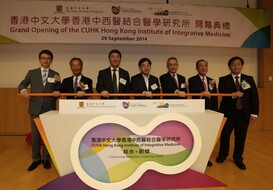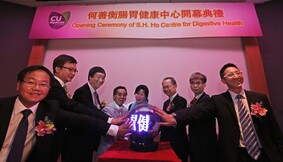News
- Home
- News
CUHK Establishes Territory’s First Institute of Integrative Medicine
To Advocate New Model of Clinical Treatment
29 SEP 2014
The Chinese University of Hong Kong (CUHK) has recently established the Hong Kong Institute of Integrative Medicine (HKIIM), the first university-run institute in the city that encompasses research, clinical practice and education in the integration of Chinese and Western medicine. The inauguration ceremony was held on 29 September 2014, officiated by Dr Ko Wing-man, Secretary for Food and Health, HKSAR Government; Prof Joseph JY Sung; Vice-Chancellor and President of CUHK; Mr Anthony WK Chow, SBS, JP, Deputy Chairman of The Hong Kong Jockey Club; Dr Edgar WK Cheng, Chairman of the Lanson Foundation; Prof Edwin CL Yu of the CUHK InteMed Fund; Prof Francis KL Chan, Dean of the Faculty of Medicine, CUHK and Prof Justin CY Wu, Director of the Hong Kong Institute of Integrative Medicine. In addition, over 200 guests and experts from the field of Integrative Medicine witnessed the establishment of a platform that promotes the integration of Chinese and Western medicine.
The use of both Chinese and Western Medicine in parallel in disease treatment is not uncommon in Hong Kong. Many patients consult both Chinese and Western medical practitioners respectively to get better treatment results. However, a safe and proven treatment model of integrative medicine, as well as a sophisticated and standard communication channel between Western and Chinese medical practitioners, has yet to be developed to achieve synergy. In view of the rising demand for integrative medicine, the Faculty of Medicine of CUHK initiated the idea of setting up an institute that encompasses research, clinical care and education about two years ago, to promote the practice of integrative medicine.
During his welcome speech, Prof. Joseph JY Sung stated, "The fundamental divergence of Chinese and Western medical practitioners’ interpretations of body constitution and of disease management actually creates room for development of integrative medicine. The Hong Kong Institute of Integrative Medicine is established with the purpose of aggregating medical experts from around the world to engage in research, clinical practice and training of integrative medicine; and thereby improving the quality of integrative medicine that will minimize disease induced human suffering."
Through an evidence-based approach, HKIIM aims to understand and assess the effectiveness of integrative medicine in treating individual diseases. In addition, it is dedicated to applying research results in clinical practice in order to construct a safe and effective integrative medical care system that will be an exemplary model for the local and international community. Moreover, the Institute will become an important platform for exchange of integrative medical knowledge and a place of training Integrative Medicine professionals. Prof. Francis KL Chan, Dean of Faculty of Medicine of CUHK said, "As one of the world’s top 50 medical schools, the Faculty of Medicine at CUHK actively engages in various medical research while tirelessly training medical professionals. In our efforts, we incorporate elements of Integrative Medicine in our conventional medical training in order to fully equip new medical practitioners who will be well prepared to face challenges and address the health needs of the society."
To accomplish its three missions of research, clinical services and education, HKIIM is established with two major sections: the East-West Research and Training Centre for Integrative Medicine for research and education purposes; and the Integrative Medical Centre for outpatient services. The former actively collaborates with the School of Chinese Medicine, Institute of Chinese Medicine, local and overseas institutions (ex. The University of Maryland which has a long history of over twenty years of collaboration with CUHK) in research projects on integrative medicine. The latter operates as a one-stop integrative medicine outpatient clinic that provides quality service to the general public.
Prof. Justin CY Wu, Director of HKIIM pointed out, "There are past research on Integrative Medicine but the results are scattered among various institutions and universities. Therefore, HKIIM of CUHK aims at building a platform for experienced local and overseas medical experts to engage in exchange of knowledge and ideas that will accelerate the development of medicine." He further elaborated, "The research focus of HKIIM will be chronic diseases such as chronic pain condition, functional gastrointestinal disorder, stroke rehabilitation, etc. whose management by Western medicine alone could be limiting; but for which Chinese medicine could provide alternative treatments. In addition, HKIIM will raise the safety standard of herb-drug interaction in order to set a standard risk management model for interaction between Western and Chinese medicine."
The establishment of HKIIM has been made possible with the generous donation from various parties, including The Hong Kong Jockey Club Charities Trust for furnishing and equipment installation of the institute; the Lanson Foundation for initial research funding; the CUHK InteMed Fund set up by the donation of Prof Edwin Yu, as well as other financial support from society. Deputy Chairman of The Hong Kong Jockey Club, Mr Anthony WK Chow said the Club has funded promotion of Traditional Chinese Medicine since 1998. "We are delighted to support the establishment of the Institute, the Institute is the first of its kind jointly managed by Chinese and Western medical practitioners, offers both Traditional Chinese and integrative medical treatment, education, research and health consultation. It helps meet the needs of different patients and facilitate personnel training," he said.
The integration of Chinese and Western Medicine is a significant milestone in the progression of medical history. Its long-term development relies on active engagement and collaboration within the medical profession to create synergy, thereby benefitting the well-being of society.
Supplementary Information
Source: Communications and Public Relations Office, The Chinese University of Hong Kong
Lee Quo Wei CUHK Golden Jubilee Scholarship Presentation Ceremony
26 SEP 2014
The first "Lee Quo Wei CUHK Golden Jubilee Scholarship Presentation Ceremony" was held on 26 September 2014. Officiating at the ceremony were Mr Thomas C B Liang, Chief Executive of the Wei Lun Foundation, and Professor Fok Tai-fai, Pro-Vice-Chancellor and Vice-President of The Chinese University of Hong Kong (CUHK). Members of the advisory committee for the Lee Quo Wei CUHK Golden Jubilee Scholarship Endowment Fund attended the event.
In his welcoming address, Professor Fok Tai-fai expressed his deepest gratitude to the Lee Family and the Wei Lun Foundation for their staunch support to the University for establishing the "Lee Quo Wei CUHK Golden Jubilee Scholarship Endowment Fund" in celebration of the Golden Jubilee of the Chinese University, and meeting the increasing demand for scholarships from our growing student population.
Through the establishment of the endowment fund, scholarships have been set up for mainland students, medical and law students, as well as exchange scholarships. Under the supervision of the Advisory Committee, the first batch of scholarships has been disbursed in the academic year of 2013-14. A total of 38 outstanding students have been awarded the "Lee Quo Wei CUHK Golden Jubilee Scholarships".
Mr Adrian Fong, recipient of the "Wei Lun Foundation Scholarship for the Faculty of Law", represented all recipients of the "Lee Quo Wei CUHK Golden Jubilee Scholarships" to express their most sincere gratitude to Mr Liang and all members of the Lee family and the Wei Lun Foundation for setting up this meaningful scholarship scheme. "We are very thankful for the continued support from the Lee family and the Foundation in carrying on the legacy of Dr the Honourable Lee Quo-wei to support education and nurture young talents for the society," said Adrian.
CUHK Welcomes the ‘Pilot Bowel Cancer Screening Programme’ and Recommends Subsidizing Residents Aged 61-70 First
17 SEP 2014
Recently, bowel cancer has become the most common cancer and the second leading cancer killer in Hong Kong, with about 4,450 new cases and causing 1,900 deaths per year. The Department of Health has started the preparatory work of a pilot programme to subsidize bowel cancer screening for higher risk groups, and is now working out the age groups to be the covered by the programme and operation details. The Chinese University of Hong Kong (CUHK) welcomes the pilot programme, and recommends subsidizing residents aged 61-70 first based on the findings by the CUHK Jockey Club Bowel Cancer Education Centre.
Supported by the Hong Kong Jockey Club Charity Trust, the CUHK Jockey Club Bowel Cancer Education Centre (the Centre) has launched a territory-wide bowel cancer screening programme in May 2008. Until December 2012, a total of 10,732 Hong Kong residents have undergone screening. It was found that more than half (54.6%) chose faecal occult blood test for screening. There was significantly more subjects aged 61-70 years chose faecal tests (75.3%) than those aged 50-60 years (54.0%). The return rate of faecal test, rate of successful faecal collection, and colonoscopy attendance rate were similar across age groups.
Worth noting that participants aged 61-70 years perceived more financial difficulties and poorer accessibility to screening services, yet they had fewer misperceptions and psychological barriers of screening. The detection rate of advanced neoplasia and cancer was much higher in the age group 65-70 years (11.9%) and 60-64 years (6.5%) than younger age groups (3.8% to 5.5%). The costs per life year saved for subjects aged 66-70 years (HK$69,120) and 61-65 (HK$310,636) were significantly lower than those aged 50-60 years (HK$726,196-1,229,828).
CUHK will fully support the HK-wide ‘Pilot Bowel Cancer Screening Programme’ subsidized by the Government, and recommend subsidizing bowel cancer screening to residents aged above 60 years as a pilot is a good start of the Government policy. It is more likely for this age group to uptake screening by faecal test, as they have fewer psychological barriers. At the same time, it is more cost effective for this age group to have bowel cancer screening.
CUHK is now working on several initiatives to provide possible solutions for the society on prevention of bowel cancer and promotion of bowel screening, including priority targeted screening for high-risk people, formulating sustainable financing model for screening and intervention, and enhancing the role of primary care doctors, especially family physicians and nurses, in bowel cancer screening.
About CUHK S.H. Ho Centre for Digestive Health
To further reduce the health threats due to bowel cancer, the S. H. Ho Centre for Digestive Health is established by the generous donation of HK$17 million from the S.H. Ho Foundation. This centre is equipped with State-of-the-Art medical equipment and aimed to provide high quality gastrointestinal exam services and trainings to health care professionals.
About CUHK Jockey Club Bowel Cancer Education Centre
In May 2008, The Institute of Digestive Disease at CUHK was generously funded with HK$16 million by The Hong Kong Jockey Club Charities Trust to set up the CUHK Jockey Club Bowel Cancer Education Centre. In 2013, an additional HK$16 million were donated to launch another phase of a 5-year bowel cancer education and screening programme.
Source: Communications and Public Relations Office, The Chinese University of Hong Kong


